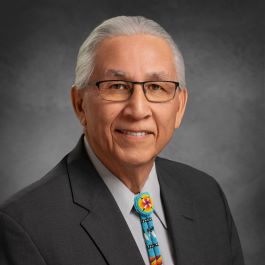
Richard M. Church, PharmD, FAPhA
At the time of his retirement, RADM (Ret) Richard M. Church was the director, Office of Public Health Support, for the Indian Health Service (IHS). Over his career, he served as a member of the Commissioned Corps of the U.S. Public Health Service (USPHS) for 34 years achieving the rank of rear admiral and an additional seven years in the civilian Senior Executive Service. He devoted his career to improving the health status of American Indians and Alaska Natives through his service in the Indian Health Service. He served in a variety of clinical and managerial positions at the local and regional program levels before assuming national roles that led to his appointment as chief pharmacist officer for the USPHS as an assistant surgeon general. He is a native of Michigan and is an enrolled member of the Match-E-Be-Nash-She-Wish (Gun Lake) Band of Pottawatomi Indians.
He played active roles, first as a clinical pharmacist and later as a national pharmacy leader, in promoting progressive pharmacy practice roles that grew out of the IHS to influence pharmacy practice nationally. Very early in his career, he sought roles that put the pharmacist directly in contact with patients to deliver pharmacy services. This included using the patients’ medical record rather than a prescription blank to fill prescriptions. This enabled pharmacists to leverage this clinical information base to expand roles to provide primary patient care and directly manage the care of patients whose primary mode of treatment was drug therapy. He built upon his grass roots pharmacy practice as he took on the national pharmacy leadership role as the national IHS chief pharmacist. Under the tenure of Surgeon General C. Everett Koop he was appointed concurrently to serve as USPHS chief pharmacist officer. He continued his advocacy for moving pharmacy practice to the forefront of patient care. He led a movement to extend IHS patient consultation practices to the entire pharmacy profession. The pharmacist patient consultation techniques developed in the IHS were shared with all professional organizations and colleges of pharmacy for incorporation into pharmacy practice curricula and training. This contributed to changing how pharmacists counselled patients across the pharmacy profession.
Building upon his clinical service foundation, he later served as IHS chief information officer, implementing a common electronic health record system across the IHS that positioned the IHS to take advantage of future clinical innovations in technology while supporting all health care providers in healthcare delivery at the patient level. In his final career assignment as director for Public Health Support, he provided national leadership in several critical public health support areas including medical epidemiology; national program statistics; planning, evaluation, and research; and health professions support. Prior to his federal service, he was an assistant professor of clinical pharmacy and lecturer in medicine at the University of Missouri-Kansas City schools of pharmacy and medicine.
He has been recognized for his years of exceptional service with a number of awards and honors, including the Surgeon General’s Medallion, the PHS Distinguished Service Medal, and the ASHP Harvey A.K. Whitney Lecture Award.




